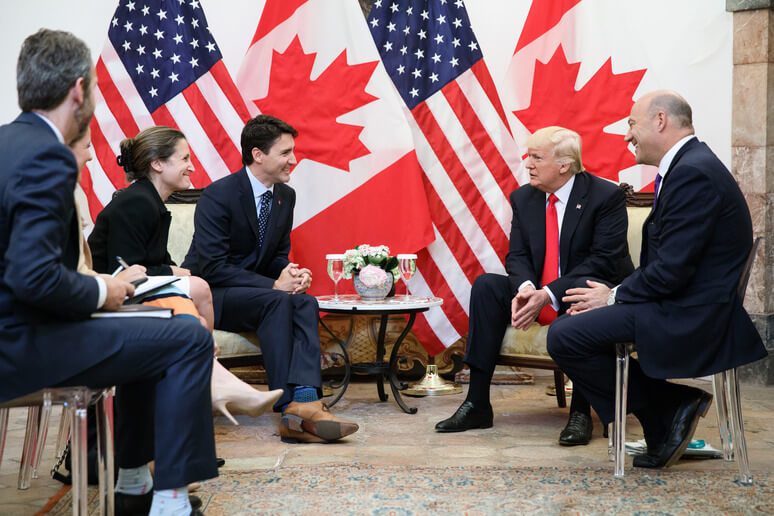 The hard work of improving the competitiveness of Canada’s industries and our chronically weak productivity must begin now, writes Philip Cross.
The hard work of improving the competitiveness of Canada’s industries and our chronically weak productivity must begin now, writes Philip Cross.
By Philip Cross, October 2, 2018
It’s worth evaluating whether Canada’s overall negotiating strategy with the US over NAFTA was effective not just in reaching a deal, but one that reflects key changes in the economy over the last three decades.
In the original negotiations three decades ago, Canada essentially “won.” This is why our political class will define the success of the new USMCA exclusively on its preserving the key features of the original NAFTA. In the original deal, we gained access to the US market and kept one-quarter of our economy exempt from free trade so it could be heavily regulated (including culture, supply management, banking and telecommunications), while adding a dispute-settlement mechanism. The US, meanwhile, gained secure access to our energy supplies in return for ending restrictions on our oil and gas exports. Canada also ceded its guaranteed minimum share of North American auto production.
The new USMCA deal only tinkers with these broad outlines. However, changes in our economy and its underlying technologies — notably the internet — in the intervening decades make parts of the original deal obsolete and not worth preserving.
The auto and energy industries were the big winners under the original trade deals and they remain our two leading exports today. However, their position in North America has diminished and will continue to shrink for the foreseeable future. Canada’s share of North American auto production peaked in the 1990s and since then has steadily eroded with no new auto plants built since 2007. The best we can do is fight a rearguard action that slows the inevitable decline of autos as production shifts to lower-cost jurisdictions in the US and Mexico. This relegates Canada to producing more auto parts, where it remains competitive — although parts production is not as lucrative as auto assembly.
“Walking away with no deal would have dealt a severe blow to our economy”
Meanwhile, new technology that produced the fracking revolution in oil and gas has led to soaring production in the US, leaving it poised to become self-sufficient in the near future. Our oil and gas exports to the US will likely continue to decline, forcing us to either find new markets or suffer the gradual decline of one of our key industries.
Other technological changes have rendered government regulation of some industries in Canada obsolete. It is pointless to protect our culture industries when any household can stream Netflix online. The precarious finances of our media industry remove any threat of takeovers by US firms (any buyer would be a welcome surprise). Meanwhile, limiting Canadians to $20 of duty-free purchases delivered from the US would have been increasingly difficult to enforce as online shopping proliferates (the new limit is $100, which might not be all that much easier to enforce). And in banking, households will be free to interact online with any financial institution in the world.
The broad outlines of this deal had been on the table for some time, once the US and Mexico invited Canada and its “progressive” trade agenda to leave the room while they hammered out the deal’s framework — especially key clauses related to the auto industry. And a deal that maintains the broad but outdated outlines of the original NAFTA is, of course, better than no deal at all, especially since the most contentious issues (think: dairy protections) were of little significance compared with the costs of losing access to the US market.
Walking away with no deal would have dealt a severe blow to our economy. It would have depressed key exports. More importantly, it would have reinforced a broader message to the international business community that Canada cannot accomplish its economic goals. We’ve got enough of that reputation for not being able to build pipelines, reduce interprovincial trade barriers or reform our tax structure.
However, protecting the status quo of a decades-old trade framework still comes with risks by not fixing those things that have become obsolete or irrelevant as technology changes, notably the internet and hydraulic fracking. Of course we need to maintain stable market conditions for autos and energy. But they will flourish only if we increase their competitiveness and diversify their export markets. That means doing a lot more than just saving NAFTA.
With the USMCA trade deal in hand, the hard work now begins of improving the competitiveness of our industries and our chronically weak productivity. It is impossible to foretell how this trade deal will play out in an ever-changing marketplace; when the original free-trade agreement was signed, no one predicted its impact on oil and gas because that was dramatically affected by better policy on royalty payments and unforeseen new technologies in the oil sands.
Any trade deal’s benefits depend crucially on policies that affect our competitiveness and our ability to innovate. Any deal without a complementary policy framework encouraging business investment and innovation will wind up being a bad deal.
Philip Cross is a Munk Senior Fellow at the Macdonald-Laurier Institute.





